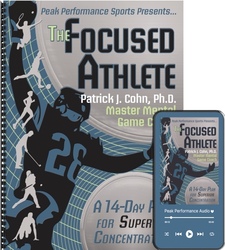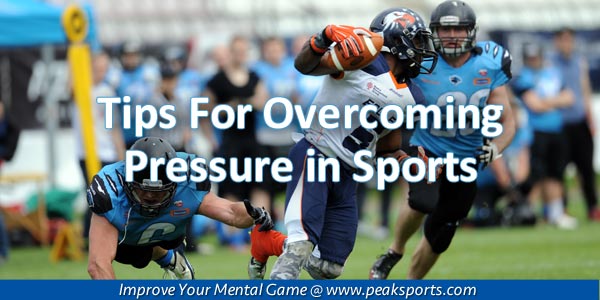Overcome Pressure in Sports
When Minnesota Vikings punter Jeff Locke learned how to control his attention, he learned how to cope better with pressure and improved his performance in games.
Pressure can get to any athlete, that is, if the athlete lets it happen.
Pressure is the perception of threat by the athlete.
Worrying about results, game conditions, and the opposing team can increase the sense of pressure experienced by athletes.
But these situations or conditions are only triggers for pressure. How athletes view these trigger are what leads to pressure in sports.
When pressure becomes excessive, athletes either freeze up in competition or overthink their next action.
I notice that athletes will play tentatively, cautiously, or afraid to make mistakes when they are anxious or worried about outcomes.
Excessive pressure can cause you to lose focus on what really matters, which is focusing on the process or what you need to do in the present to play optimally.
Focusing on what makes you feel pressure tends to turn performance into a life-or-death proposition.
For example, a football placekicker is faced with a 20-yard field goal with one minute remaining and the game on the line…
The kicker can focus on his routine for the kick: lining up the kick, measuring his steps behind the ball, visualizing the kick, seeing the ball, approaching the ball and kicking the ball…
When the kicker can focus on his routine this can help him cope better with the pressure.
Why?
The kicker’s routine helps him focus on the process of kicking the ball instead of worrying about the outcome of missing or disappointing teammates.
Or the kicker can focus on the wrong things that lead to pressure:
–The last kick he missed
–The importance of the present kick
–How teammates or coaches will respond if he misses the kick
–A poor snap or place
–Poor conditions, such as the wind
–The kick being blocked
–Worrying about losing his spot on the team with a failed attempt…
There is a myriad of negative things to worry about for many athletes in sports and most are outside of your direct control.
When you focus on the “triggers for worry” the pressure becomes unbearable.
Minnesota Vikings punter Jeff Locke is learning the benefits of a proper focus.
Locke averaged a career-low 37.8 net yards per punt last year. After a season of under-performing, Locke sought advice from a mental performance coach to help him improve his mental approach to kicking.
With the help of his mental performance coach, Locke takes each kick one punt at a time which has drastically reduced the pressure he experienced last year when he constantly tried to have ‘the perfect game.’
LOCKE: “There was almost too much pressure to try to have a perfect game, which just puts pressure on you in general. It just causes too much stress. So, I’ve learned to change that approach to have a great first punt and then clear it and then have a great second punt and clear it and then just move on from there. That’s really helped me kind of string games together.”
Locke’s focus on the process has helped him let go of the pressure and perform his best on each attempt.
LOCKE: “We call it, ‘One punt at a time. You control what you can control… If I mess up, learn from it, move on, next punt. So, I can control how I set up, how I catch the ball, how I drop the ball and how I swing, and that’s it. So everything else around me doesn’t matter.”
By focusing on what he can control and his routine, Locke has a career-best net average of 39.7 this year and is tied for second in the NFL with 21 punts inside the opponents’ 20-yard line.
Tips for overcoming pressure:
Understand that pressure is something you create for yourself, not the situation you are in when competing.
What’s under your direct control in competition? Be specific and consider elements of effort, the process of the performing an action, mental focus and your reactions to circumstances during competition.
Focus on what you can control for your role, not the outcome that leads you to worry and feel pressure.
If you start to focus on your triggers for pressure, stop and remind yourself to focus on your routine and what you can control. You can’t control the outcome, so no need to fret about it.
Do you want to boost your concentration? Click here to learn how!
Related Sports Psychology Articles
- How to Compete Well in Pressure Moments
- How to Perform Big in Pressure Moments
- Is Pressure Your Friend or Foe?
*Subscribe to The Sports Psychology Podcast on iTunes
*Subscribe to The Sports Psychology Podcast on Spotify
Download a free sports psychology report to improve your mental game!
Learn more about our one-on-one mental game coaching.
The Focused Athlete

It’s probably no secret that you have many opportunities to become distracted in sports. Athletes are bombarded with both internal and external distractions everyday in practice and competition. Focused athletes are able to get the most from their skills because they are more efficient with practice and more concentrated in competition. Athletes who lack focus let distractions run wild through their mind and don’t know how to adjust or refocus.
The Focused Athlete was developed for any level coach, parent, or junior to professional athlete who wants to improve performance and gain a competitive edge. It does not matter if you are a fledgling junior athlete; or a seasoned professional, plagued with distractions; or you just wanting to learn how to improve concentration…
“The Focused Athlete” is a complete system to teach you how to focus like a champion and harness the power of a zone focus every time you step on the playing field, court, track, or course in practice and games!


